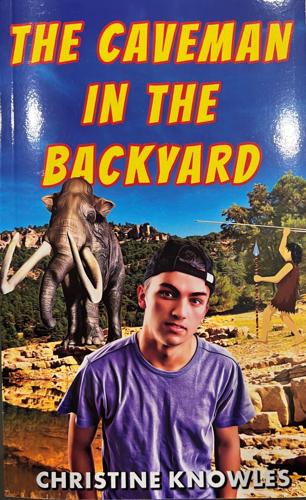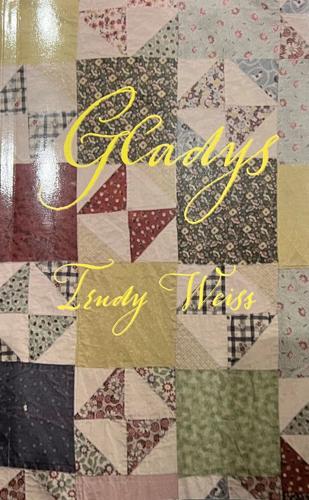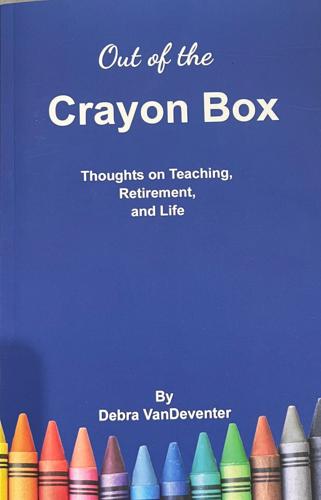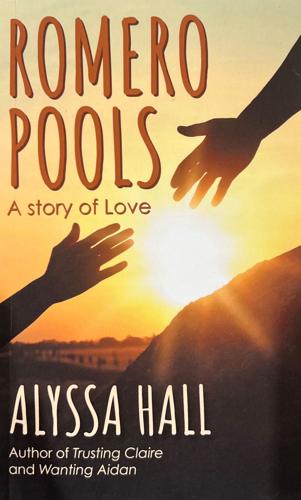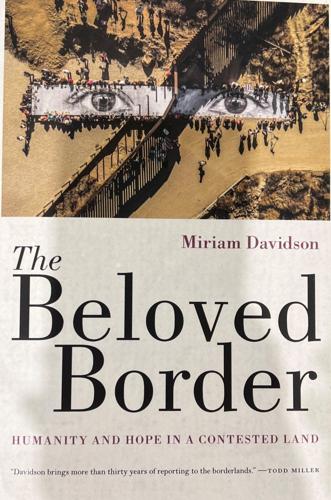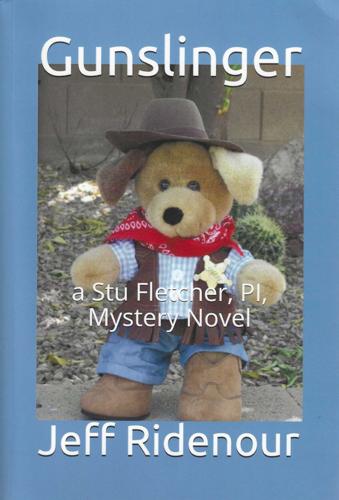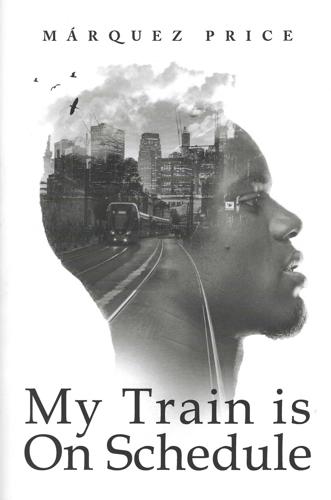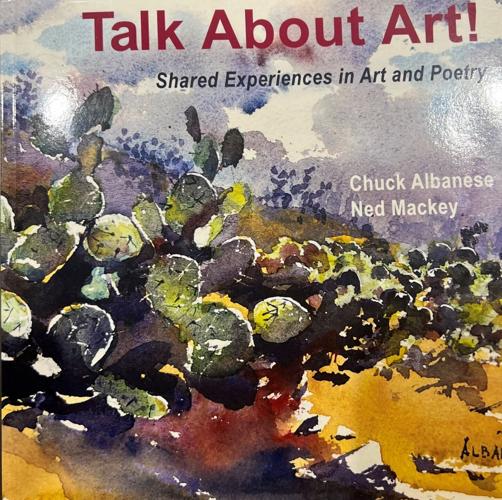“The Caveman in the Backyard” By Christine Knowles. Independently published; $9.49; $3.99 Kindle.
A trio of time-traveling, 21st century kids find comradeship and adventure among Paleolithic people when they pass through an opening in the Earth at the Murray Springs Clovis Site and land in the ice age.
The quest for a highly-prized spear point adds intrigue to this novel for middle school readers, and kids will relate to the real-time family dynamics of the time travelers. There’s plenty of well-researched and fact-checked information cleverly woven into the plot about Clovis culture, prehistoric animals and the science that revealed that world to us. The message that there might be fewer differences than we think between us and ancestors who lived 13,000 years says important things to kids about the timelessness of humanity.
In addition to being a writer, author Christine Knowles edits an international scientific research journal. She lives in Tucson.
— Helene Woodhams “Gladys” By Trudy Weiss. Self-published. $16.99.
Family ties, domestic turmoil and the hardscrabble life of pre-Dust Bowl Oklahoma inform this richly-detailed historical novel, based on the author’s family oral history and her grandmother’s life story.
From the time she was a young girl, Gladys Simmons’ life has been marked by tragedy, back-breaking work and the cruelty of her brutal, anguished father. Luckily, her life has been blessed by two caring brothers and the kindness of strangers; with their support she matures into a capable, self-reliant woman, possessed of a resiliency that she clearly didn’t inherit from her father. But, the author intimates, who can truly understand what’s bred in the bone? As a bonus, old family photos and favorite recipes from her grandmother round out this debut novel by Tucsonan and retired teacher Trudy Weiss.
— Helene Woodhams “Out of the Crayon Box: Thoughts on Teaching, Retirement, and Life” By Debra VanDeventer; independently published; $11.99, $3.99 Kindle.
“Timing is everything, plan way more than you think you’ll need, and expect the unexpected.” These are hard and fast rules of teaching, says former elementary school teacher Debra VanDeventer. But as her smart, highly entertaining memoir suggests, they really do double duty as a personal philosophy. After a rewarding, 37-year career in the classroom, about which she shares touchingly lovely memories and from which she actually retired twice (once in Indiana, then again after a few bonus years at Manzanita School in Tucson), VanDeventer found that retirement was a shock to her system. Abandoning her multitasking ways, adapting to a new rhythm in her days and following her bliss instead of a schedule was surprisingly challenging, but the Oro Valley resident is clearly as adept a learner as she was a teacher. One of the unexpected things she discovered about herself was her flair for writing creative nonfiction, and it’s on display here: Her adventures in retirement are a delight to read.
— Helene Woodhams “Romero Pools: A Story of Love” By Alyssa Hall. FriesenPress. $31.99 hardcover; $20.30 paperback; $9.99 Kindle.
Marin didn’t anticipate conducting a back-country rescue as she hiked the ridge above Romero Pools. But when Adam drops, literally, into her life, it turns out to be the stroke of luck she’s needed since her fiancé, Tyler, disappeared after their disastrous car wreck.
Helping Adam limp down the mountain, Marin relates how her disapproving parents were bent on thwarting their romance and that now, to her bewilderment, she can find no trace of Tyler and doesn’t know if he survived the crash. Adam, an endlessly resourceful psychologist, determines to investigate the mystery surrounding Marin’s Romeo and Juliet tragedy and discovers secrets far darker than anyone had imagined.
Alyssa Hall, a Canadian snowbird and part-time Oro Valley resident, overlays her tale of intrigue with a love letter to Tucson, incorporating favorite scenic destinations, landmarks, restaurants and even El Tour de Tucson into the narrative. This is her third book.
— Helene Woodhams “When Pigs Flew: The TFX Affair” By Chris Hansen. Able Baker Press. $28, $9.99 Kindle.
The Kennedy administration’s awarding of the coveted contract for the TFX (Tactical Fighter Experimental) fighter bomber to the General Dynamics Corporation in 1962 — despite having received a lower bid from the Boeing Corporation for what some considered a better-designed plane — prompted an extensive congressional investigation.
The final report, says author Chris Hansen, was disappointingly opaque as regards purported corruption, political shenanigans, corporate influence and mob connections. The plane, more commonly known as the F-111, was itself highly controversial.
Hansen, a retired aerospace engineer who lives in Tucson, believes that, 60 years later, the full story of the TFX has yet to be completely understood. With this ambitious volume, equal parts aviation history, engineering and political exposé, he offers a deeply researched, blow-by-blow account of the affair as he understands it. At 800-plus pages it’s not a casual read; the author suggests that readers use the table of contents as an aid to navigation.
— Helene Woodhams “The Beloved Border: Humanity and Hope in a Contested Land” By Miriam Davidson. University of Arizona Press. $19.95 paperback.
This book’s title alone could attest to journalist Miriam Davidson’s personal and professional investment in our troubled U.S.-Mexican borderland — her third book on the region.
Opening with a parable of a “special place” — rich and biodiverse — which is corrupted by the greed of empire, but manages to restore cultural and environmental harmony, Davidson immediately launches into “Gangland,” examining the effects of the drug war in Mexico. Elucidating gang activity, she devotes a harrowing chapter to murders of individual members of the press. She provides historic context for the drug trade that ignited such violence, and U.S. complicity (read Operation Fast and Furious) in fueling it.
“Slavery” focuses on the plight of the undocumented in the U.S., the detention and treatment of asylum seekers, the deaths of the estimated 10,000 migrants since the 1990s, efforts to identify human remains, humanitarian aid in the desert and abuses of authority. Finishing with some sense of hope, “The Peaceable Kingdom” discusses the Sanctuary Movement, the natural environment, and the beauty of cross-border cultural community. The epilogue lays out specific recommendations for change. You’ll recognize local heroes, and be reminded of Tucson’s willingness to respond to human and environmental crises.
It’s an eminently readable, comprehensive addition to the body of borderlands work.
— Christine Wald-Hopkins “Gunslinger” By Jeff Ridenour. Self-published. $9.99 paperback; $.99 Kindle.
Clues abound that this fourth Stu Fletcher, PI, mystery is not meant to be the noirest noir on the shelf … starting with the cover photo of a teddy bear sporting a badge and a gun. Jeff Ridenour writes that he wanted to write something light, but also to skewer Scottsdale, with which his ‘60s high school self was at odds.
In “Gunslinger,” set in 1969, Fletcher is called from his California base to Scottsdale to investigate the murder of a mystery bookstore’s owner. There’s good money to be had, and he accepts, despite his reservations about the racist detective who taps him. Dubbed “Gunslinger” for his penchant for shooting traffic arrests, the detective’s been pulled off the case because his girlfriend is a suspect.
A slate of suspects is compiled and investigated, a bevy of beguiling broads gets thrown in Fletcher’s path, some betrayals occur, and a semi-innocent is sacrificed before the murder is solved.
Ridenour clearly enjoyed the little PI jaunt, which weaves together noir films and elements of mystery writing, and mocks the snobbish, morality-impaired, racist culture of 1960s Scottsdale.
This reader enjoyed it, too.
— Christine Wald-Hopkins “My Train is On Schedule” By Márquez Price. Self-published. $11.99 paperback; Kindle available.
Powerful in its economy and cultural acuity, this collection of poems speaks to a universal audience from a young Black man’s perspective. A philosophy and sociology graduate of the University of Arizona, 10 years in social work, Price is empathetic and thoughtful.
Personal and lucid, the poems range from short, observational pieces (“Being a pallbearer in the morning/and a best man later that night,/was my lesson of living in the present”); though profiles (“Uncle Randle”: “… because of the dexterity of his right hand …/ He taught me how to look at both sides”); to longer narratives, of which, the affecting ”My Brother’s Keeper” traces life divergences of best friends from boyhood: “…You spent the most quality time in one year as you ever/had with your father,/as each other’s cellmate in prison….”
It’s a collection you’d give to someone who mistakenly believes he can’t relate to poetry.
And Márquez Price’s poetic train is decidedly on schedule.
— Christine Wald-Hopkins “Talk About Art! Shared Experiences in Art and Poetry” By Chuck Albanese and Ned Mackey. Forewords by “Big Jim” Griffith and Diana Madaras. Wheatmark. $29.95.
This collection of “ekphrases” by painter Chuck Albanese and poet Ned Mackey is a delight to the eye and a tweak to the imagination. To each of the 28 paintings by Albanese, Mackey provides a response in poetry (the “ekphrasis”). His third collection of ekphrases, retired TUSD English teacher Mackey then invites the reader to write some as well.
Architect, retired professor and former University of Arizona architecture dean, Albanese draws from life experiences for his evocative paintings: for decades, he led painting trips to Greece and Italy. Many of his watercolors and oils thus depict affecting seaside or village scenes — boats; village men in quiet contemplation or afternoon cards or chess. The collection includes local urban and desert scenes.
Albanese’s most vivid paintings are religious in nature. And one of them — “Our Lady of the Persecuted Christians” — provokes its richest artistic conversation: To the work of the Christian painter by the agnostic poet, Mackey writes: “Centered, Christ, wise beyond his years/ … already knowing the end of everything/ He blesses us anyway, believer or not.” Lovely.
— Christine Wald-Hopkins


